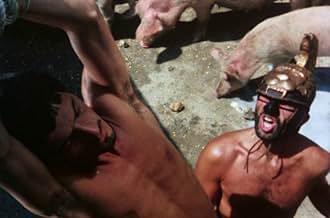Reassigned to a lowly outpost, a Roman guard's Christian beliefs clash with his gay commander's desire for closeness. Being tortured becomes pleasurable.Reassigned to a lowly outpost, a Roman guard's Christian beliefs clash with his gay commander's desire for closeness. Being tortured becomes pleasurable.Reassigned to a lowly outpost, a Roman guard's Christian beliefs clash with his gay commander's desire for closeness. Being tortured becomes pleasurable.
- Awards
- 1 nomination total
- Sebastian
- (as Leonard Treviglio)
- Emperor's Guest
- (uncredited)
- Emperor's Guest
- (uncredited)
- Emperor's Guest
- (uncredited)
- Emperor's Guest
- (uncredited)
- Emperor's Guest
- (uncredited)
- Emperor's Guest
- (uncredited)
- Emperor's Guest
- (uncredited)
Featured reviews
Consider the film's approach to homosexuality. No one is defined as being a homosexual, so that at first seems like a de-politicization of sex -- all there are are acts, and acts are not political. But at the same time, it's acts that are disdained and made illegal, and without the "political" approach to defining (and thereby defending) people as homosexuals, it leaves the acts open to censorship and condemnation -- politicization. As a film itself, though, it is not pedantic or accusatory -- in fact, Sebastian is killed, it seems, because of the lust of Severus, who he refuses. Like the Christian God who Sebastian loves and sees as more beautiful than Adonis, Severus wants Sebastian. But it isn't just condemning lust, either -- Anthony and Adrian are openly lovers, and the abundance of male nudity, and the eroticism of it by Jarman, could hardly be called prudish. In fact, there is a scene at night of the men grabbing each other, their dark-lit bodies, and the soldier pressing his near-naked, muscled body on his lover, that still seems shocking in its passion today.
It's more like a lyrical tone poem, and Brian Eno's New Age-y score goes well with that. Jarman isn't a bully, and when the crucifying comes around he doesn't bludgeon us -- first we see a close-up of his face, as arrows pierce through Sebastian's skin, silently with the exception of the wind, and Jarman gives us one final distorted image to meditate on the death of the one we can't have. 9/10
Visually striking (as is typical of Jarman), this film is best known for being the first film to be filmed entirely in Latin (The Holy Office (from Spain) in 1975 had some dialogue in Latin, but also Hebrew), and also for being Jarman's debut feature (he had worked on three pictures beforehand, including Ken Russell's The Devils, but this was his first directing job). As with most of Jarman's work, Sebastiane is very arthouse, and will rarely be played on television (Channel 4 here in the UK last played it a few years ago in a Jarman season). Next time it's on, do as I intend to do, and watch it.
Did you know
- TriviaWhen asked about the film's nudity, director Derek Jarman replied "We couldn't afford costumes."
- GoofsThe soldiers play with a modern Frisbee in one scene. When one soldier catches it, the logo appears.
- Quotes
Sebastian: His eyes are so beautiful. He has sky-blue eyes.
Justin: What is this? What are you talking about?
Sebastian: His hair is like the sun's rays.
Justin: Sebastian...
Sebastian: His body is golden like molten gold. This hand of his... will smooth away these wounds. Justin, he is as beautiful as the sun. This sun which caresses me... is his burning desire. He is Phoebus Apollo. The sun... is his... burning kiss.
- Alternate versionsWhen shown on British television in the 1980s, a shot of a naked man with the erection was cut out of the film.
- ConnectionsFeatured in Arena: Derek Jarman - A Portrait (1991)
- How long is Sebastiane?Powered by Alexa
Details
Box office
- Gross worldwide
- $4,091
- Runtime1 hour 26 minutes
- Sound mix
- Aspect ratio
- 1.37 : 1
Contribute to this page
























